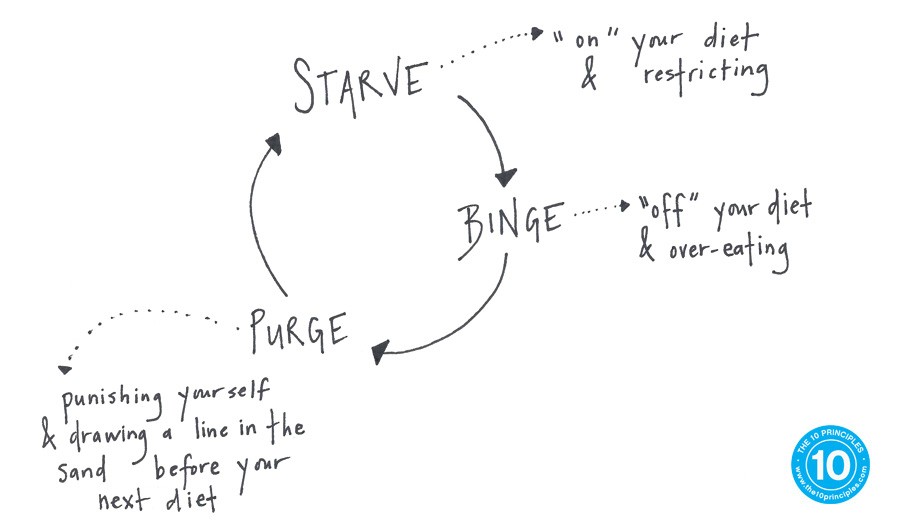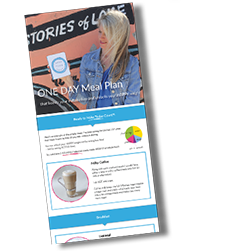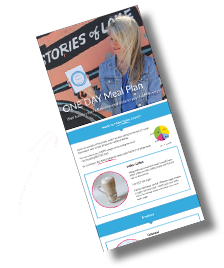
- Princess Diana’s bulimia story made it easier for me to ask for help
- The signs and symptoms of bulimia & how to get support
- Diana’s bulimia story proves you can survive and thrive
Princess Diana’s bulimia story is part of season four of The Crown.

Have I seen it?
No!
The bulimia part—not the princess part.
(Princess-y stuff has never been my thing.)
Diana’s bulimia story needs to be told
The reason I haven’t seen The Crown Season 1, 2 or 3 is because I haven’t turned on my tv since Christmas 2019 (11 months ago) when we watched half of Love Actually.
The thing that gets me up in the morning is helping people unlock their H 🙂 PPY weight without dieting.
Why?
Because dieting creates a complicated relationship with food that can lead to the starve-binge-purge cycle:

And all this gets in the way of you being the:
friend
oil painter
partner
president
mother
soccer player
sister
Gr. 7 teacher
daughter
owner of a shop that only sells fair trade tea
…or anything else you want to be.
My mission is for people to take all the energy they put into dieting and redirect it into something that gets them up in the morning.
Or figuring out what that something is.
For instance, one of my 1:1 clients wants to get healthy because her goal is to stop being a lawyer and open an animal sanctuary.
Another one wants to be a marine biologist so she can be the change in ocean preservation.
And I can go on and on…
To me, nothing is more exciting than watching people get freedom from diet obsession.
Especially when they just need some good information and a little support to get over the hump of trying something new.
And often that journey back-to-health begins after learning it’s possible to beat bulimia (or any degree of disordered eating) just like Diana did.
Diana’s bulimia story is back in the spotlight
So while I haven’t seen The Crown, I see that Diana’s bulimia story is dominating headlines.
THE WASHINGTON POST:
Fact-checking ‘The Crown’: Did Princess Diana’s bulimia ruin her marriage?
VANITY FAIR:
Inside The Crown’s Depiction of Princess Diana’s Bulimia
VOGUE:
Princess Diana’s Real-Life Battle with Bulimia
DAILY MAIL:
How can hypocrite Harry complain about how the press treated his mother but sell his soul for millions to Netflix sharks who’ve portrayed her as a shallow, vomiting lunatic and his father as a bullying, bed-hopping monster?
(The Daily Mail really knows how to twist the knife, non?)
Oprahmag.com
Princess Diana Called Her Eating Disorder a “Symptom” of Her Unhappy Marriage
On every news outlet,
entertainment show
and all over social media…
there’s talk of Diana’s bulimia.
Then on Sunday Night my friend Nicole DM’d me to say:
The Crown season 4 is on netflix. Including Diana’s eating disorder. I see another blog post for you there 😅
23 years after Diana’s death she’s STILL changing lives
Diana is best known for being The People’s Princess rather than (the once) next-in-line to the throne.
Diana would become an early and influential advocate for LGBTQ people during a time when much of the world turned their backs on them.— biography.comShe’s always worked with people on the fringe of society.
Outcasts and those overlooked. From Leprosy to Landmine Survivors to LGBTQ.
Diana, who was friends with Freddie Mercury (of the band Queen!) and Elton John, was one of the first high-profile people to hold hands with someone who had AIDS. She did that in 1987 in an effort to de-stigmatize this condition.
To Diana’s disappointment, the Queen did not support this type of charity work, suggesting she get involved in ‘something more pleasant’ – The Telegraph
Princess Diana was always breaking barriers
And she could put herself in other people’s shoes.
Sharing her bulimia story on the now famous November 20th, 1995 episode of the BBC show Panorama, as well as in her biography by Andrew Morton, is just another example of her bravery and leadership.
Keep in mind… the BBC was one of only 4 channels in the UK at the time. Her story’s reach was (in the words of Trump) “tremendous”.
“She was very candid about what she called her “secret disease” [bulimia] and I was really impressed. I thought that that was massively ahead of her time,”
– Emma Corrin, actress who plays Diana in The Crown
Princess Diana’s bulimia story helped me
 Diana was the first public figure I came across who shared that she’d had bulimia.
Diana was the first public figure I came across who shared that she’d had bulimia.
This information not only helped me stop feeling so alone, it gave me hope.
Can you imagine how many people in 1992 (when Diana’s biography came out) suddenly believed they could get better?
Over 33 million Americans alone, have disordered eating. In yet, bulimia – or even the self-defeating preoccupation with counting calories, reading labels for fat-content and stepping on the scale – are almost never part of movies or tv shows.
The omission of how destructive dieting is in popular culture made me think I should be even more ashamed.
“For Princess Diana to speak openly about these behaviors and thoughts really shows her strength and her dedication to helping others because it is likely that most people would never have even known she was fighting an eating disorder” – Dr. Becker
Why doesn’t anyone talk about bulimia?
So many other tough topics are tackled in teen flicks, soap operas and Oscar-winning films.
I’m a documentary junkie. And every year before Toronto’s Hot Docs Festival, that stretches over 2 weeks with 100’s of titles, I scour the program. But there’s never (to my knowledge—and to the best of my Googling abilities) been a story about disordered eating.
And we’ve seen 100’s of (incredible) documentaries for nearly 2 decades.
The closest we’ve come is the heart-breaking biography of the beloved Gilda Radner. Another trailblazer I love. ❤️
Sadly, shame extended how long I kept my disordered eating a secret.
And secrets isolate you with misinformation and make it nearly impossible to get support or recover.
“Her example not only de-stigmatizes eating disorders themselves but also sets an example for seeking help and addressing the shame around these behaviors, thoughts, and feelings that allow them to persist.” – Dr. Becker
But when I learned that Diana had opened up about her eating disorder, and was still accepted and loved, it got me inching a little closer to asking for help.

Princess Diana’s bulimia story helps everyone
By sharing that she had disordered eating, Princess Diana has created ongoing awareness about a once taboo topic, for years, and right up to now… Season 4 of The Crown.
So after Nicole messaged me, I wrote back:
When you saw the bit about Diana + eating disorder… I’d love to know… as someone who hasn’t had bulimia – what did you think of what you saw? What did you think in terms of Diana’s bulimia story being on tv? Being part of The Crown? Please don’t hold back!
 Nicole Tschierske has her PhD in chemistry and she’s a positive psychology coach who helps women in science and tech use their head and heart to get seen and noticed in their company so they can attract their next opportunity. After a coach helped her get her dream job she knew she wanted to do the same kind of magic for other women in STEM.
Nicole Tschierske has her PhD in chemistry and she’s a positive psychology coach who helps women in science and tech use their head and heart to get seen and noticed in their company so they can attract their next opportunity. After a coach helped her get her dream job she knew she wanted to do the same kind of magic for other women in STEM.Nicole has *not* had an eating disorder.
So I wanted to know what she thought.
Her reply?
Bad enough that her own family ignored it and did nothing. So if this graphic portrayal of bulimia helps to raise awareness and others are horrified and more willing to help because of Diana’s story (instead of ignoring it) then it might be good for others who suffer from an eating disorder.
I’m with Nicole.
Awareness doesn’t always come in a pretty box with a bow on it.
Sometimes it has to stop you in your tracks and make you think. Even feel uncomfortable. Then people can become more empathetic about stuff they don’t understand.
These days I always tell people I blog about eating disorders, especially if I think they’ll squirm. Then I know I’ve done my job.
Nextflix could have omitted Princess Diana’s bulimia
And sugar-coated the story in a Disney-esque way.
But because they chose to share it they’ll be opening up avenues for conversation in MILLIONS of homes around the world.
The truth is always more interesting than fiction. And much more powerful.
A total of 73 million households worldwide have watched royal drama The Crown since it began in 2016, according to figures released by Netflix— bbc.comEverybody has a friend or family member who has a complicated relationship with food.
Having a common experience via watching The Crown can be the perfect jumping-off point for discussion.
And it doesn’t have to be with an older, wiser family member.
Time and time again I hear stories, in real life and in documentaries (documenting real life!) of an older brother confiding first in his little sister that he’s gay.
Being able to tell someone you trust, stops your secret from being bottled up inside.
The first step is not about answers.
It’s just having another person in the world know.
So let me ask you:

What’s bulimia nervosa?
Bulimia is a serious, potentially life-threatening eating disorder.
A person who has bulimia binges (often secretly) and then purges (to get rid of the extra calories) in an unhealthy way.
For instance, by:
- vomiting
- taking laxatives
- or excessive exercise
What are the symptoms of bulimia?

My eating disorder
It wasn’t until I was out for lunch with my friend Lenore a few years ago (and nearly 2 decades after I got healthy), that I realized that bulimia was life-threatening.
She basically told me:
Forceful vomiting can cause tearing of the lining of your esophagus, the tube that connects your throat to your stomach. If it tears, it can cause severe and life-threatening bleeding. This is known as Mallory-Weiss syndrome. Bright red blood in your vomit is a symptom of this syndrome.
-WebMD
And there’s all sorts of other bulimia-related health issues you can read about here, on Wikipedia, and all over the web.
I was caught (without realizing) in the starve-binge-purge cycle between the ages of 14 and 24.
After days of hardly eating anything and exercising on average 17 kilometers a day, I’d wind up “breaking down” and overeating. (I didn’t even know the word binge!)
I never understood what was going on.
Based on what diet culture teaches us, I just thought I lacked determination and discipline each time I “broke my diet.”
And all my attempts to prove I had the willpower to follow my (undereating and over-exercising) plan, got in the way of my:
- school work
- social life
- & all the sports I loved
So because I didn’t really understand my behavior, I never judge others.
I think that’s why Diana had such empathy for people who don’t fit into set categories.
As far as I know the main damage I’ve done is to my teeth. I had to have a root canal a couple years ago.
I got LUCKY.
Only some of the Signs and Symptoms listed above describe my experience
I definitely had the swollen salivary glands.
Here I am when I first became bulimic:

Here I am years later, near the end of my eating disorder (I was still very ill), just after my first attempt at giving myself highlights at home:

The effect? A wig!
I must have been hoping it would mask my chipmunk cheeks.
And here I am (below) after I got healthy.

This photo is a “school picture” from when I had my first full-time class, teaching Grade 1 at Forest Hill Public School in Toronto.
I loved my class! We were a little team. And I was still on cloud 9 experiencing life free of disordered eating.
Still am.
Getting healthy is possible! And it was one of the most exciting times of my life.
Changing your life, is all about:
having good eating and exercise information
getting some help over the hump of trying something new
and being willing to TRUST THE PROCESS
Oh, and this is me now.
Sittin’ around Toronto trying to get a pic that can work for this post.

We didn’t have a Diana magazine so we used a green folder for a “green screen”.
YOUR diet experience, my disordered eating and Diana’s bulimia aren’t that different
I kind of see my severe case of disordered eating as a gift.
It was so bad I had to do something about it.
And I was 100% willing to TRUST THE PROCESS.
So the last 21+ years I’ve been my H 🙂 PPY weight and eating and exercise has been a complete non-issue.
But whether you have:
- bulimia nervosa
- anorexia nervosa
- binge eating disorder
Or any other disordered eating or preoccupation with food and weight anywhere along the spectrum…
The ultimate goal was the same for me, Diana and for you:
To normalize your relationship with food
You don’t have to do anything unhealthy to BE healthy.
A healthy body is a reflection of healthy habits.
And the secret to lasting weight loss is being kind to yourself.

Diana’s bulimia story was one of the first
Other high profile people who have shared their struggle with disordered eating to create awareness include:

- Karen Carpenter
- Alanis Morissette
- Demi Lovato
- Elton John
- Russel Brand
- Paula Abdul
- Dennis Quaid
- Katie Couric
- Taylor Swift (Queen of pop!)
- Lady Gaga
- Lily Collins
- Zayn Malik
- Jane Fonda
- Sophie Trudeau (Canada’s first lady)
- Hilary Duff…
Some of these names surprised me.
And sadly, there’s so many more.
How to get help for bulimia and other eating disorders
1. Tell someone you trust
2. Educate yourself
Here’s a few articles I wish I’d read when I had a complicated relationship with food, and had no idea how to get better:
a) Why you should ask for help
b) Why asking for help is a strength
c) My first step to recovery was getting professional help
d) What to do if you think your daughter has disordered eating
e) How I broke the cycle of starving, bingeing and purging
3. Ask for help
There’s only so much you can learn from reading. A lot of your learning will come from doing.
Trial and error.
Hit and miss.
And carrying on after a mistake.
(Don’t make a small problem, big by saying “I ruined the day and will restart tomorrow“!)
“Diana said the disease continued for several years until she got professional help. And she never shied away from talking about it” – Washington Post

Keep moving forward after a choice you regret.
Speed up your learning curve
Work with someone who understands what you’re going through and can give you good information so you don’t have to reinvent the wheel.
It took me 10 years to lose 10 pounds (!) because I had to weed-out misinformation and then patchwork all the good stuff together.
Decide if you want to speak to a doctor, coach who’s been in your shoes, or your family, chosen family or friend.
And build in accountability!
Who can you check in with each week?

Diana’s bulimia is just one part of her story
Diana continues to change so many people’s lives, across so many countries—including people who’ve never met her, like me.
Whether it was children’s hospitals, like Great Ormond Street (I had the honor of volunteering there too when I took my PGCE in London) or her countless patronages, Diana was a giver.
She also:
- campaigned for animal rights
- was the President of Barnardos – a charity for orphaned children
- got creative by having her dresses and suits sold at Christie’s auction houses in London and New York with the proceeds going to all sorts of charities
And Diana was involved with so many organizations who worked with the:
- homeless
- youth
- drug addicts
and the elderly.
Along with dozens and dozens of other demographics.
Diana not only survived bulimia, she THRIVED
And… she was a hella-lotta good fun.
Here’s a snippet from actress Cleo Rocos memoir: …And she did.
…And she did.
But Diana is described best by her brother, in a passage you’ll recognize from his eulogy at her funeral:
Diana was the very essence of compassion, of duty, of style, of beauty. All over the world she was a symbol of selfless humanity. All over the world, a standard bearer for the rights of the truly downtrodden, a very British girl who transcended nationality. Someone with a natural nobility who was classless and who proved in the last year that she needed no royal title to continue to generate her particular brand of magic.
– Earl Spencer
Diana’s bulimia story in The Crown
So I haven’t turned on my TV since last winter.
I can’t even see our tv! There are boxes of books and piles of things we’ve found on dog walks in front of it that I’ll run to the Salvation Army as soon as Toronto’s lock-down is over. But all this stuff I’m aiming to clear is so we can watch the 2nd half of Love Actually this year.
Or David Attenboroughs Life of Birds (I keep hearing it’s amazing).
Or maybe I’ll just watch The Golden Girls… on mute.
But one day we’ll get Netflix (Phase II of cleaning the front room) and I’ll watch The Crown.
BOTTOM LINE:
Whether Diana’s bulimia scenes are:
“too graphic”
(The Sun quoting Royal experts who slammed The Crown)
or
“a breakthrough on-screen for eating disorders”
(The Telegraph)
Diana’s bulimia story is true.
And one that needed to be told.
Because Diana’s reach continues far and wide and saves lives, even decades after her death.
Make Today Count
 Whether you or someone you love has mild disordered eating or a full blown eating disorder, watching The Crown together is one way to prompt an important discussion.
Whether you or someone you love has mild disordered eating or a full blown eating disorder, watching The Crown together is one way to prompt an important discussion.
Build healthy eating and exercise habits. A healthy weight will follow

Next Steps
Royal problems are common problems. If you have an eating disorder tell someone you trust. And if someone you care about has disordered eating the number one thing is to be unconditional. As I explain in this article, it might take a little time and just spending some time together, before your loved one is ready to open up.
Did you watch The Crown Season 1, 2, 3 and/or 4?
What did you think?
If not, whatcha watchin’ instead?
What do you want to do with all the freed-up time and energy you get from overcoming disordered eating?
Let me know in the comments below!


 These kinds of meals and snacks unlocked my HAPPY weight 21+ years ago (I lost 30 pounds without dieting!)
These kinds of meals and snacks unlocked my HAPPY weight 21+ years ago (I lost 30 pounds without dieting!)
You'll also be subscribed to my newsletter. Don’t like it? Unsubscribe in one click

 These kinds of meals and snacks unlocked my HAPPY weight 21+ years ago (I lost 30 pounds without dieting!)
These kinds of meals and snacks unlocked my HAPPY weight 21+ years ago (I lost 30 pounds without dieting!)
You'll also be subscribed to my newsletter. Don’t like it? Unsubscribe in one click




Sharing what I learned makes the 10 years I STRUGGLED worth it






Hi Kelly! Thanks for the article, it was an interesting read and now I want to watch further seasons of the Crown, I loved season one! 🙂 I was wondering if you think sufferers could find the episodes slightly triggering? I know films depicting EDs are often controversial because they can carry a LOT of stereotypes, like To The Bone did. I think they are really good for raising a bit more awareness but if it only comfort people in their prejudices against EDs (as the Daily Mail seems to be doing…), it’s not very good then is it? Have a lovely day x
Hi Lulu!
When I had disordered eating I found movies and tv shows about people trying to overcome anything, inspiring. Like when I saw the movie “When a man loves a woman” starring Meg Ryan, I saw huge parallels between our experiences, despite her being a mother struggling with alcohol-use disorder (alcoholism) and me being a 15 year old with disordered eating. Meg Ryan’s journey through the movie made me feel not so alone and also kept me searching for answers – believing I could (spoiler alert!) get healthy too. EVERYBODY is different for sure so I can only speak from my experience.
Because The Crown has a “Trigger Warning” at the start of Season 4 it gives people a chance to decide if they want to continue watching.
The world is full of people who write, think and say things like The Daily Mail, so in a way it’s good practice to know not to take everyone’s opinions on board. And some people will never be interested in putting themselves in other people’s shoes. The Daily Mail is very click-baity and that approach to stories will always be part of the news-scape. So as long as you know to take them (and others like them) with a grain of salt, they can even add some humor. You gotta laugh when someone is both arrogant and ignorant.
Thank you so much for your thoughtful comment. xoKelly